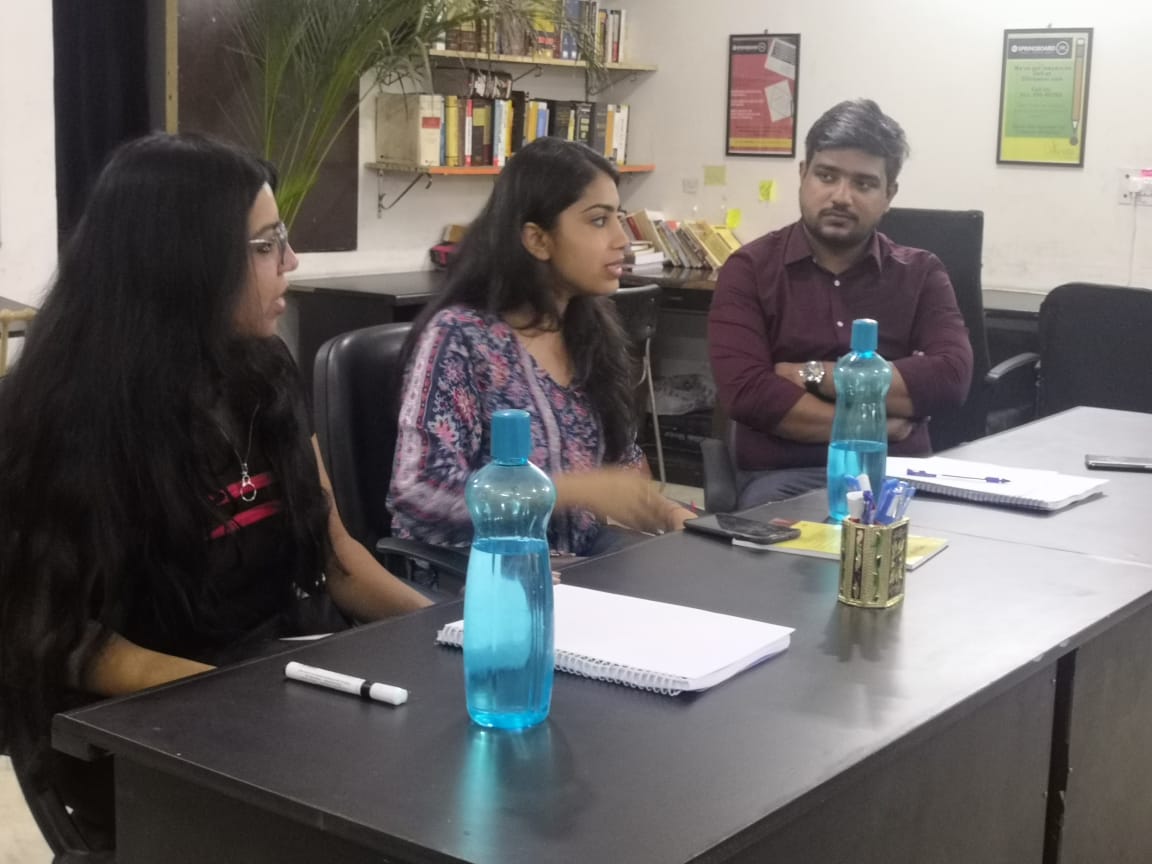This article is written by Kashish Khattar, a fourth-year student at Amity Law School, Delhi.
There can be a couple of ways of spending a Saturday night in a place like Delhi. Most people were partying or chilling with their family and friends.
However, there are a lot of fun and intellectual discussions happening at different places in the capital. I was invited to be a part of one of them. The discussion was about legal writing.
A couple of lawyers and law students sat down to have an interesting discussion about legal writing. Legal writing is still an underserved industry and is waiting for a boom to happen.
The panel consisted of:
- The Arbitration expert – Mr Tariq Khan;
- The legal journo – Ms Apoorva Mandhani; and
- The legal reporter turned business dev consultant – Ms Prachi Srivastava.
The panel took up a couple of questions to kickstart the discussion about legal writing. Ms Apoorva has done quite a lot of interesting things in her legal career. She talked about her journey of how she started to write in her law school days. In my opinion, that was an interesting turn in her journey. She was looking for some kind of financial independence and Livelaw, still, a 5-6-month-old startup was looking for good writers. It was a match made in heaven.

Apoorva goes on to talk about how this was her life for 2 years after she graduated from Symbiosis, Pune. She was waking up and sleeping with her laptop. Apoorva was then approached by Shardul Amarchand Mangaldas. She was given the responsibility of curating content for their website. She basically had to create content for the newly revamped website.
The BigLaw firms are finally waking up to the digital boom and starting to realize the importance of content marketing and blogging to make their brand more appealing for the clientele.
Apoorva then goes on to talk about, again, how she was approached by her present employer The Print on social media. Apoorva stresses that her digital footprint and social media presence has actually helped in getting her brilliant opportunities. Her social media presence is what she says has made the difference. Apoorva, after the panel has concluded, asserts that she would’ve agreed that it was a fluke if it only happened once. However, she is certain that social media strategy works. Prospective employers are looking for potential job candidates on social media.
In my opinion, Apoorva has a fantastic following and reach on Linkedin, where she got her first job offer. Further, her twitter got her second job offer. She further discussed on the panel as to what actually works on social media. She calls it “the connect”. She was pretty sure that social media responded and engaged better when she opened herself up to them. Her well-engaged posts are about her personal and everyday experiences. I am still curious about how the connect part works and ask her about this after the discussion has ended.
She gives me a couple of examples and says – “People love stories!”.
I can not believe the social media magic works in a country like ours. If you talk to colleagues, acquaintances or anyone outside of India. You’ll know this is the norm. There are no day zeros, no placement weeks outside. Networking works. Networking is the norm.
Further, someone from the audience asked about how he can research better for a particular research project that he is working on. Apoorva shared a really fascinating story about her recent experience with a senior officer in the government.
Apoorva had approached an officer for some comments on a particular article that she had been working on. She could not get the meaty part of the story out of him. This is where her editor suggested that she go and meet him in person. The editor suggested even if the story part doesn’t work, she’ll make an acquaintance.
The meeting went rather unexpectedly, Apoorva got all the answers that she was looking for just because she went ahead and met with him. That is what she says, made the difference. Meeting with people will help you get more answers and actually show you the ground realities for research.
The next member on the panel was Mr Tariq Khan who started with how he started his journey as a lawyer. He started talking about his social media presence and commented that whenever he or his other friends google themselves. The first thing that turns up is his interview on Superlawyer.
I tried googling Tariq up and I was surprised. With a population of 1 billion in the country, it wouldn’t be surprising to have a lot of Tariqs on the internet. However, the first suggestion that google gives up is Tariq Khan advocate.
Speaking of brands, Tariq’s main line on his Linkedin describes himself as an academician, author, lawyer, columnist and professional speaker. I have watched his video about arbitration on an Hour with Lawsikho before. I was sure he would live up to everything that he describes himself like that. But oh boy, I was in for a surprise. The dynamic Tariq Khan is much more than that.
He started off by advising every law student in the room on the etiquette of submitting research. He suggests that no law student is required to copy the relevant paragraphs from the judgement, make a doc file for it and send it to the person who asked for it.
This, he said never works for him. Why will an associate who is looking for a relevant part of the law trust an intern?
The right way to research and impress a person is not being the fastest. Not finding more judgements. He says it is to find the right judgement. He advocates for quality over quantity.
Alas, it is what every impulse of ours is up against. The winner is not the one who comes first but it is the one who does the job better. You have to find one relevant judgement, highlight the part and send the judgement back to the person who asked for it. It is that simple.
He then starts off with his love for the written word. He suggests that everyone should love reading judgements. That’s how you get ahead. That’s how you understand what is actually happening in the case. He is a fan of Justice Krishna Iyer and his writing. I found an article authored by him where he has actually quoted Mr Iyer from his various judgements. It makes up for an interesting read.
Further, Tariq is an arbitration guy. You would have read or heard his name somewhere. That’s the kind of brand people make. You hear about Tariq, you immediately think of a lawyer. Further, if you’re in the market, if you hear of Tariq, you will know there is an Arbitration involved.
How many BigLaw lawyers do you think to have this kind of a brand? There may be a few, but not many. It’s hard to build a brand in a big law firm because the firm does not want you to become famous and strike out on your own. The focus is on building the brand of the firm, or sometimes the managing partner, and not the lawyers who work there.
How has he sought to achieve this? Hard work. That’s the short answer.
The long answer is that he has authored a book, regularly writes for Bar and Bench, Livelaw and every big publication in the law industry. He judges moot court competitions, speaks on events, is part of every big discussion. And this is just his brand building. Tariq regularly appears for his clients at various forums, has been a part of various domestic and international arbitrations.
The thing that makes me really anxious is that he also only has 24 hours in the day! How does he do so much? Further, Tariq talked about his secret sauce behind his up to date knowledge about arbitration. He says it is hard work and he does it day to day. He finds out about who are the judges on the arbitration roaster on the High Court. And then searches their name and reads every judgement that they give out every week. He says that now he knows how a judge actually writes his judgement. You get to identify the kind of writing style that a judge adopts in writing. That comes with time and experience of reading judgements. He further asserts that Rome wasn’t built in a day. But he can now write articles very quickly, can keep track of new developments relatively easily and can actually help someone looking for a case law through his knowledge. That all came to him because he put in so much time to read judgements regarding his subject.
When I went to talk to him after the event was over about what could he suggest for a final year law student who was looking for opportunities in arbitration? He gave me the crux of his lecture, you gotta read. Be up to date. You won’t have the practical exposure, that’s understandable. But be the arbitration guy from college. Try to get to know everything that you can about Arbitration. That’s the secret.
The third person on the Panel was actually a ex-journalist from a very famous website in the legal circles – Legallyindia.com. Miss Prachi Srivastava started off her session by asking, Tariq knows everything about his subject. But what is he looking to do?
He needs a clientele to be an exceptional lawyer. And that comes with a laser-sharp focus over how to grow it. She talked about how lawyers could better target potential clients by publishing and sharing content in a simpler and more accessible manner. She suggested that every lawyer should have a substantial presence on social media and should actually push comprehensible content from all their platforms. She even suggests that people trying to make a digital presence should actually try to engage in conversations. Such as engaging on important legal discussions regarding an ongoing issue could be quite a good step towards the same.
She mentioned various ways in which she now helps lawyers with targeted content marketing. This was a really important and insightful discussion on how much time and energy lawyers need to put in to grow their business.
The panel was an amazing set of different people from the legal background. There was an expert lawyer, a legal journo and a journalist-turned-legal-content-marketeer. Each one of them suggested how much legal writing is essential for the profession. And I took away the lesson that developing this particular skill is the way to go.
 Serato DJ Crack 2025Serato DJ PRO Crack
Serato DJ Crack 2025Serato DJ PRO Crack










 Allow notifications
Allow notifications


